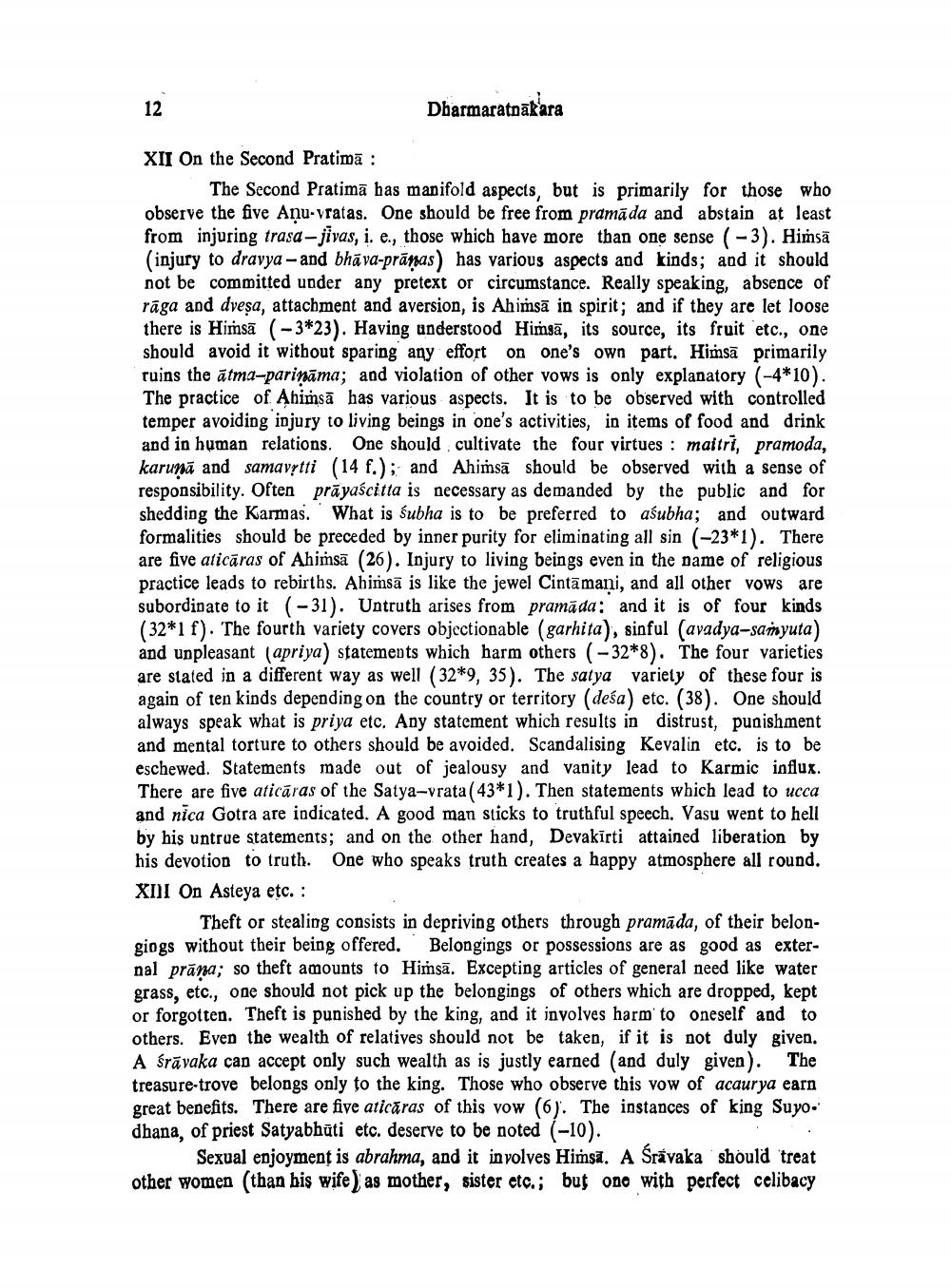________________
12
Dharmaratnakara
XII On the Second Pratima :
The Second Pratima has manifold aspects, but is primarily for those who observe the five Anu-vratas. One should be free from pramada and abstain at least from injuring trasa-fivas, i. e., those which have more than one sense (-3). Himsä (injury to dravya-and bhava-prānas) has various aspects and kinds; and it should not be committed under any pretext or circumstance. Really speaking, absence of raga and dresa, attachment and aversion, is Ahimsa in spirit; and if they are let loose there is Himsa (-3*23). Having understood Himsa, its source, its fruit etc., one should avoid it without sparing any effort on one's own part. Himsa primarily ruins the atma-parinama; and violation of other vows is only explanatory (-4*10). The practice of Ahimsa has various aspects. It is to be observed with controlled temper avoiding injury to living beings in one's activities, in items of food and drink and in human relations. One should cultivate the four virtues maitri, pramoda, karuna and samavṛtti (14 f.); and Ahimsa should be observed with a sense of responsibility. Often prayaścitta is necessary as demanded by the public and for shedding the Karmas. What is subha is to be preferred to asubha; and outward formalities should be preceded by inner purity for eliminating all sin (-23*1). There are five alicaras of Ahimsa (26). Injury to living beings even in the name of religious practice leads to rebirths. Ahimsa is like the jewel Cintamani, and all other vows are subordinate to it (-31). Untruth arises from pramada; and it is of four kinds (321 f). The fourth variety covers objectionable (garhita), sinful (avadya-samyuta) and unpleasant (apriya) statements which harm others (-32*8). The four varieties are stated in a different way as well (32*9, 35). The satya variety of these four is again of ten kinds depending on the country or territory (desa) etc. (38). One should always speak what is priya etc. Any statement which results in distrust, punishment and mental torture to others should be avoided. Scandalising Kevalin etc. is to be eschewed. Statements made out of jealousy and vanity lead to Karmic influx. There are five aticāras of the Satya-vrata (43*1). Then statements which lead to ucca and nica Gotra are indicated. A good man sticks to truthful speech. Vasu went to hell by his untrue statements; and on the other hand, Devakirti attained liberation by his devotion to truth. One who speaks truth creates a happy atmosphere all round. XIII On Asteya etc.:
Theft or stealing consists in depriving others through pramada, of their belongings without their being offered. Belongings or possessions are as good as external prana; so theft amounts to Himsa. Excepting articles of general need like water grass, etc., one should not pick up the belongings of others which are dropped, kept or forgotten. Theft is punished by the king, and it involves harm to oneself and to others. Even the wealth of relatives should not be taken, if it is not duly given. A śravaka can accept only such wealth as is justly earned (and duly given). treasure-trove belongs only to the king. Those who observe this vow of acaurya earn great benefits. There are five aticaras of this vow (6). The instances of king Suyodhana, of priest Satyabhuti etc. deserve to be noted (-10).
Sexual enjoyment is abrahma, and it involves Hims. A Sravaka should treat other women (than his wife) as mother, sister etc.; but one with perfect celibacy




